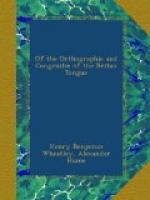10. Of this letter the latines themselfes had tuae other sounds differing the ane from the other, and beath from this, quhilk they symbolized be adding an other voual, ae and au. And these they called diphthonges.
11. The diphthong they defyne to be the sound of tuae vouales coalescing into ane sound, quhilk definition in au is plaen, in ae obscurer as now we pronunce it, for now we sound it generallie lyke the voual e, without sound of the a, q_uhi_lk, notwithstanding is the principal voual in this diphthong sound. Questionles at the first it semes to have had sum differing sound from a, sik as we pronunce in stean, or the south in stain. But this corruption is caryed with a stronger tyde then reason can resist, and we wil not stryve with the stream.
14. E followes, q_uhi_lk in reason sould have but ane sound, for without doubt the first intent was to geve everie sound the awn symbol, and everie symbol the awn sound. But as now we sound it in quies and quiesco, the judiciouse ear may discern tuae soundes. But because heer we differ not, I wil acquiess. My purpose is not to deal with impossibilities, nor to mend al crookes, but to conform (if reason wil conform us) the south and north beath in latine and in English.
15. Af this voual ryseth tuae diphthonges, ei and eu, quhilk beath standes wel with the definition, sect. 11.
16. Of the next, i, we differ farder, and the knot harder to louse, for nether syde wantes sum reason. Thei in mihi, tibi, and sik otheres, pronunce it as it soundes in bide, manere; we as it soundes in bid, jubere.
17. Among the ancientes I fynd sum groundes for their sound. Cic. epist. fam. lib. 9, epis. 22, avoues that bini, in latin, and +binei+ in Greek, had ane sound. And Varro, with sundrie ancientes, wrytes domineis and serveis, for dominis and servis, quhilk is more lyke the sound of bide then bid. If this argument reached as wel to i short as i lang, and if we wer sure how +ei+ was pronunced in those dayes, this auctoritie wald over-weegh our reason; but seing i, in mihi, etc., in the first is short, and in the last co_m_mon, and the sound of ei uncertan, I stand at my reason, sect. 9, q_uhi_lk is as powerful heer for i as ther for a. They pronunce not i in is and quis, id and quid, in and quin, as they pronunce it in mihi, tibi, sibi, ibi, etc., and therfoer not right.
18. As for o, in latin, we differ not; u, the south pronu_n_ces quhen the syllab beginnes or endes at it, as eu, teu for tu, and eunum meunus for unum munus, q_uhi_lk, because it is a diphthong sound, and because they them selfes, quhen a consonant followes it, pronunce it other wayes, I hoep I sal not need argumentes to prove it wrang, and not be a pure voual.
OF THE BRITAN VOUALES.
Cap. 3.
1. Of a, in our tongue we have four soundes, al so differing ane from an other, that they distinguish the verie signification of wordes, as, a tal man, a gud tal, a horse tal.




